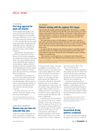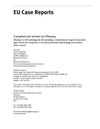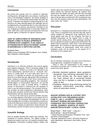 August 2023 in “Stem Cell Research & Therapy”
August 2023 in “Stem Cell Research & Therapy” A substance called Cell-free fat extract can effectively treat common hair loss by increasing hair growth and density.

A girl lost her hair due to being given the wrong medication because of a pharmacy's computer error.
November 2024 in “Skin Appendage Disorders” Start low-dose minoxidil gradually, especially for women, to reduce side effects.
[object Object]  5 citations,
March 2019 in “Dermatologic Clinics”
5 citations,
March 2019 in “Dermatologic Clinics” New treatments for hair loss show promise, but require more research on long-term effects and proper dosing.
 July 2017 in “Nursing2023”
July 2017 in “Nursing2023” Actemra is approved for a specific artery condition, HIV treatment adherence has improved, women may pay more for a hair loss product, and incorrect dosing of blood thinners can be risky.

An infant with a zinc deficiency skin disorder improved with zinc treatment.
[object Object] The combination of high-dose toremifene and capecitabine was effective for advanced recurrent breast cancer.
 8 citations,
August 2011 in “Journal of Pharmacology and Experimental Therapeutics”
8 citations,
August 2011 in “Journal of Pharmacology and Experimental Therapeutics” Dosing time affects finasteride's effectiveness and safety in rats.
 103 citations,
June 2006 in “British journal of sports medicine”
103 citations,
June 2006 in “British journal of sports medicine” The document concludes that better biomarkers are needed to detect long-term oral testosterone use in athletes.
 July 2007 in “Journal of Generic Medicines”
July 2007 in “Journal of Generic Medicines” The UK High Court revoked Lundbeck's patent for Escitalopram, and second medical use claims based on dosage were not considered novel.
 116 citations,
February 2017 in “Journal of the American Academy of Dermatology”
116 citations,
February 2017 in “Journal of the American Academy of Dermatology” JAK inhibitors help with skin conditions but need more research on dosing and safety.
 20 citations,
January 2012 in “Journal of Steroids & Hormonal Science”
20 citations,
January 2012 in “Journal of Steroids & Hormonal Science” The document concludes that there are still unknowns about the effectiveness, risks, and detection of performance-enhancing drugs, and doping remains a challenge.
 59 citations,
February 2003 in “Veterinary Dermatology”
59 citations,
February 2003 in “Veterinary Dermatology” Cyclosporin is effective for treating skin conditions in small animals, but requires careful dosing and monitoring for side effects.
 13 citations,
October 2010 in “Pharmacogenomics”
13 citations,
October 2010 in “Pharmacogenomics” Researchers found that most genes affecting drug responses are not fully covered by commercial SNP chips, suggesting the need for more comprehensive tools to optimize drug selection based on genetics.

Low-dose oral isotretinoin improved hair loss and facial bumps in patients with a specific type of hair loss.
 28 citations,
October 1998 in “Baillière's clinical endocrinology and metabolism”
28 citations,
October 1998 in “Baillière's clinical endocrinology and metabolism” Testosterone replacement may help post-menopausal women with androgen insufficiency, but more research is needed on its benefits and risks.
 7 citations,
April 2023 in “Frontiers in immunology”
7 citations,
April 2023 in “Frontiers in immunology” Oral baricitinib and ruxolitinib are effective and safe for treating alopecia areata.
 3 citations,
April 2019 in “Journal of Dermatological Treatment”
3 citations,
April 2019 in “Journal of Dermatological Treatment” Caffeine shows promise for treating some types of hair loss, but more research is needed.
 3 citations,
January 2019 in “Elsevier eBooks”
3 citations,
January 2019 in “Elsevier eBooks” Pharmacists should interpret lab data and perform physical exams to improve patient care.
 2 citations,
November 2011 in “Journal of Infection”
2 citations,
November 2011 in “Journal of Infection” A woman with asthma improved from a severe fungal infection after treatment change, and most HIV-positive women in a UK study had low immune cell counts but were responding well to treatment.
 January 2019 in “Springer eBooks”
January 2019 in “Springer eBooks” Acne can appear or persist in adulthood due to hormonal changes, external factors, or substance use, and requires appropriate treatment.
 441 citations,
May 2008 in “British Journal of Pharmacology”
441 citations,
May 2008 in “British Journal of Pharmacology” Anabolic steroids can build muscle and strength but have risks and need more research on their clinical benefits and side effects.
 209 citations,
March 1989 in “Journal of The American Academy of Dermatology”
209 citations,
March 1989 in “Journal of The American Academy of Dermatology” Interferon alfa-2a is effective for treating cutaneous T cell lymphoma but has significant side effects.
 127 citations,
June 2008 in “British Journal of Clinical Pharmacology”
127 citations,
June 2008 in “British Journal of Clinical Pharmacology” Low doses of some substances can be beneficial, while high doses can be harmful or toxic.
 August 2010 in “The Journal of Dermatology”
August 2010 in “The Journal of Dermatology” The document concludes that low-dose acne treatment is most suitable for moderate acne, with high patient satisfaction and low relapse rates.
23 citations,
January 2016 in “Frontiers in immunology” Using low-dose IL-2 to increase regulatory T cells might be a safe way to treat type 1 diabetes without severe side effects.
19 citations,
April 2019 in “Veterinary dermatology” Oclacitinib effectively treated a skin condition in dogs that didn't respond to other immunosuppressants.
40 citations,
June 2021 in “Clinical, cosmetic and investigational dermatology” JAK inhibitors show promise in effectively treating hair loss from alopecia areata.
20 citations,
June 2020 in “Journal of Advanced Research” High-dose vitamin A and E with zinc improved blood sugar control and insulin function in diabetics, but may cause hair loss.
 18 citations,
March 2022 in “Drug design, development and therapy”
18 citations,
March 2022 in “Drug design, development and therapy” Platelet-rich plasma (PRP) may help with various hair loss types, but more research is needed to find the best use method.
























